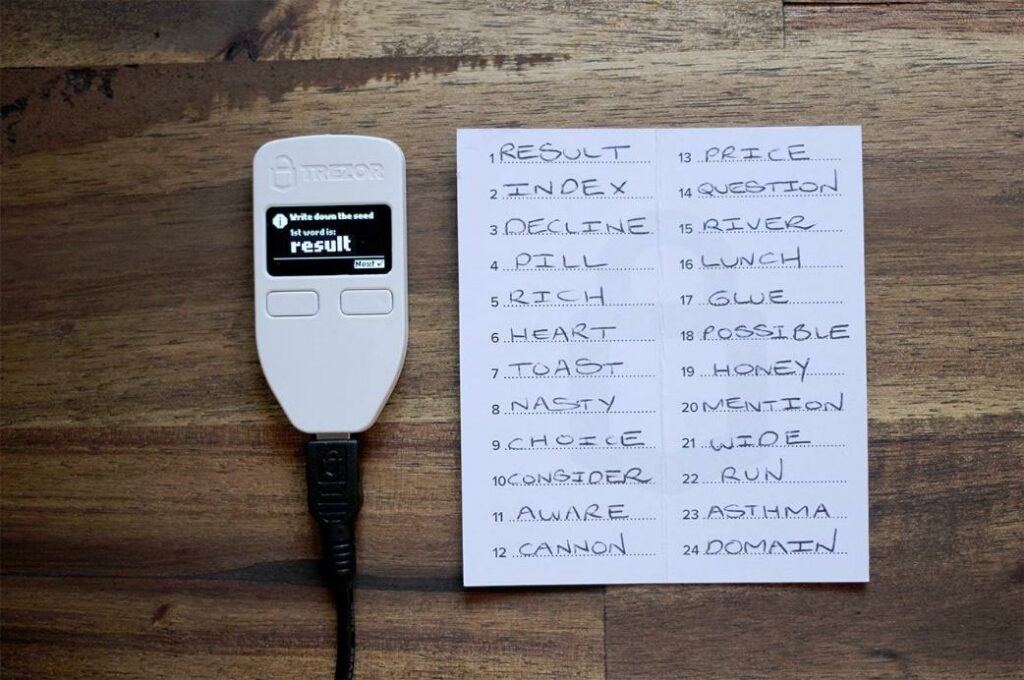For all the wonders of cryptocurrencies, they are vulnerable to cybersecurity hackers due to their exposure to the Internet. In addition to the current lax regulatory measures, any theft or other loss means coins are virtually impossible to retrieve or track.

Therefore, understanding how to keep coins thoroughly is vital. Consequently, many investors have begun switching towards cold storage to store the bulk of their holdings.
In this case, users will be familiar with seed phrases, a common hallmark with ‘hot’ or hardware wallet providers, decentralized exchanges, and several altcoins to recover their coins when conventional access has been lost.
This article will cover what this security feature is, how it operates, its safety importance and how users should secure the phrases.
What is a recovery seed phrase?
A seed phrase is a grouping of 12, 18, or 24 randomly generated English words used to retrieve someone’s wallet due to a reset, theft, loss, or damage. Other terms to describe this feature include mnemonic seed or mnemonic phrases.
Although seed phrases don’t necessarily need memorization, they must be kept securely, as failure to do usually results in the holder not being able to recover their coins. In most cases, this means unrecoverable access to the holdings. Below are examples of a seed phrase:
‘witch collapse practice feed shame open despair creek road again ice least
‘forget wing follow flip swallow achieve correct view dinner witness hybrid proud’
These words come in a specific order from 1-12, 1-18, or 1-24, and users must enter them in this pattern during recovery. Any missing part of the phrase will prevent access to the wallet/s in most cases.
The software generates a seed phrase by taking random words from the English dictionary. In some cases, users can decide on their own expressions, though it’s usually better to stick with the predetermined terms.
Each word is allocated to a number convertible to a particular binary seed integer in a private and public address for a specific wallet. Essentially, a seed phrase is a simplified coded version of this data, making it easier to back up and restore one’s holdings.
The importance of seed phrases
Nowadays, seed phrases are used to recover not just one but tens of unrelated crypto assets in a portfolio. For hardware wallets and decentralized exchanges, seed phrases act as a last line of defense in the case of theft, loss, or damage.
Most phrases use the industry-standard known as BIP39, a systemized index of 2042 words. The typical 12-word seed is known to have 128 bits of security, while the 24-word has 256 bits of security.
Hackers would need to perform several thousands of operations on 12-word phrases (2048^12 to be exact) to crack the sequence. While not mathematically out of the question, it is highly impractical. Experts consider 12 words as long enough, though the lengthier the seed becomes, the higher its security.
It’s worth noting no wallet actually stores any assets. Rather, it maintains the public key for receiving crypto from other users and, more importantly, private keys for accessing that particular wallet.
The latter is essentially the digital signature or the ‘master key’ to the blockchain where the coins are.
Other alternatives to seed phrases include binary, hexadecimal, or QR codes, which are considered more complex to use and prone to human error. In contrast, seed phrases are much simpler to record and repeat when stored safely and accurately.
Methods of backing up recovery seed phrases
The significance of backing up seed phrases cannot be understated when using hardware wallets, decentralized exchanges, and some altcoins. Private keys are the most sensitive data for any holder of cryptocurrencies, and once compromised in any way, the risk of loss tremendously increases.
Over the years, several inventive methods have come to light for backing up these phrases. Let’s look at the most popular ways they are stored:
- Paper: Writing the phrases down on paper using a pen or pencil, while seeming old-school, is one of the simplest, tried-and-tested procedures. Furthermore, even when written in poor handwriting, mnemonic phrases have adequate error correction.
However, as expected, experts consider this far less secure because of its inferior durability. Yet, it’s technically better than storing the words on a computer. Nonetheless, with this approach users will write the phrase in a few pieces of paper stored in guarded locations.
Some even store the seed phrase in two parts by allocating a paper for each half of the phrase in separate places. Another interesting technique is Shamir secret sharing, a cryptographic algorithm application where the phrase is split into parts required to decipher the entire secret.
- Metal seed phrase keepers: These are stainless steel or titanium devices with the seed phrase engraved or stamped. They are resistant to floods, extreme temperature, water, and other eroding damage, making them more durable than paper and practically indestructible.
While being one of the simplest, one method not recommended for backing up seed phrases is as a file on a computer or cloud service because of malware attack risks.
Final word
While cryptocurrencies are wonderful, they have presented unexpected challenges, specifically when it comes to their daunting storage. In essence, private keys are valuable for any holder. When in the wrong hands, access to a wallet becomes virtually impossible with little or no retrieval.
Therefore, protecting the seed phrases is paramount to preserve a user’s wealth. It’s worth mentioning that not every cryptocurrency investor needs to worry about seed phrases.
These are most common with decentralized exchanges/wallets and several altcoins not used in custodial settings, where the exchange or service maintains the private keys of its users.








